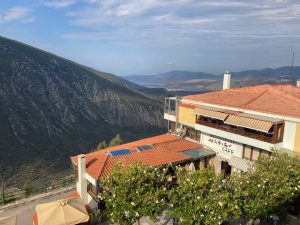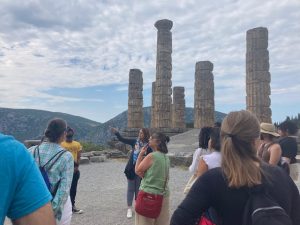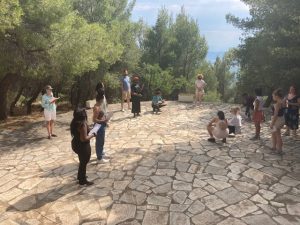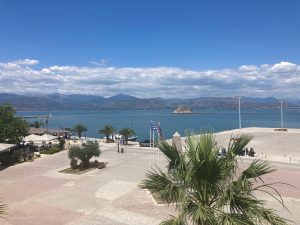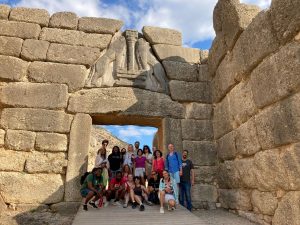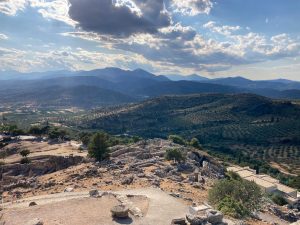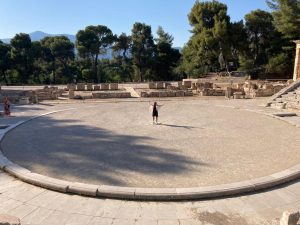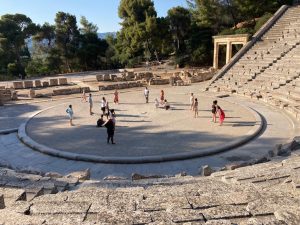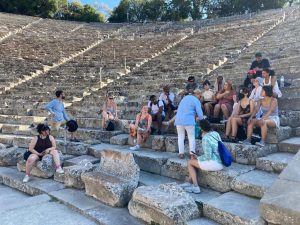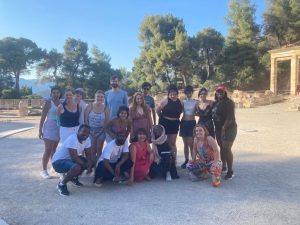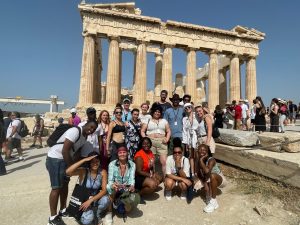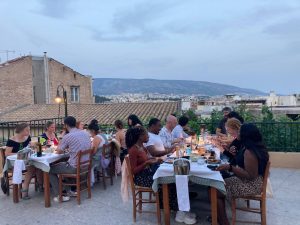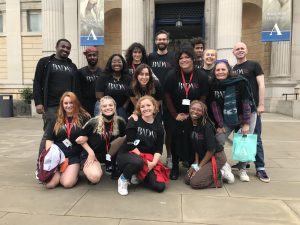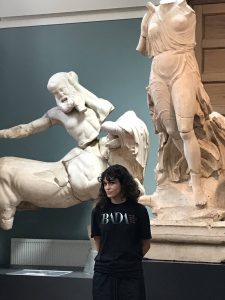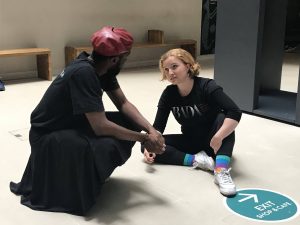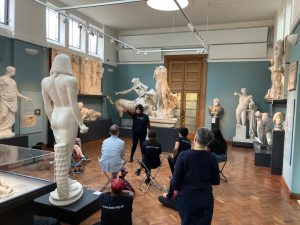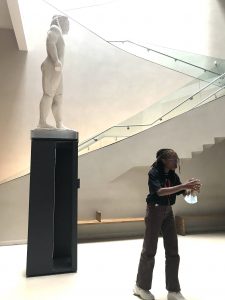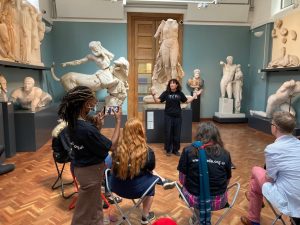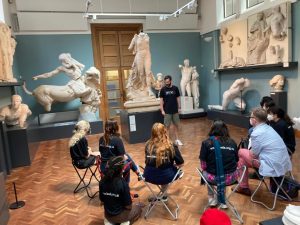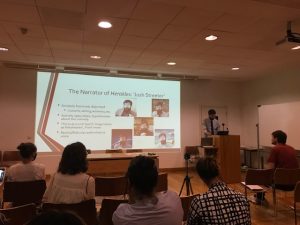HIGHLIGHTS FROM THE INAUGURAL GREEK THEATRE PROGRAM
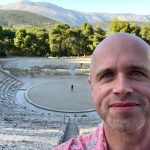 |
Greek Theatre Course Director Paul O’Mahony shares highlights from the first Greek Theatre Program in 2022. |
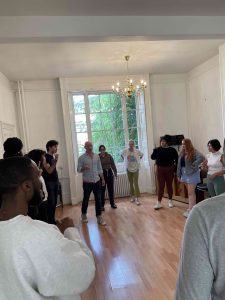
Class with Course Director Paul O’Mahony
Our inaugural Greek Theatre Program ran in June 2022 with a brilliant 17-strong group drawn from across the US. My intention when designing the course was to combine methods of learning, exceptional theory and world-class practice led by leading figures in the UK and Greece – over the course of 4 weeks we all had the chance to put that idea to the test in the most incredible and inspiring locations imaginable. I’ve always been fascinated by ancient theatre and during the first lockdown of 2020 I started an online theatre project with Harvard’s Center for Hellenic Studies – we challenged ourselves to live stream a different tragedy every week. Our aim was to create a community at a time when we were all experiencing isolation in lockdown, and to explore what these ancient plays would illuminate in our own lives and experiences. Over the course of 40 consecutive weeks in 2020 we performed every extant tragedy with an incredible international ensemble (including several BADA alums) and it transformed how I saw these plays. This insight and passion led to the creation of the Greek Theatre Program.
The first leg of the course took place in London, with two weeks at BADA’s Camden base. The academic schedule was organised by Fiona Macintosh (Professor of Classical Reception and Director of the Archive of Performances of Greek and Roman Drama at Oxford University) and sat alongside regular studio time in which we explored text and performance on our feet. Fiona taught with Marcus Bell (lecturer at Goldsmiths), covering a vast array of topics to provide crucial context for the plays. I worked on the acting side – exploring tragedy on our feet, working with several plays.
Movement classes were led by Joyce Henderson from Complicité. Joyce is an amazing artist and teacher, and she introduced an incredible approach to exploring chorus which the group really responded to. We were also fortunate to have Leo Wringer teaching Shakespeare in Performance – I wanted everyone to have the chance to explore classical texts from various eras.
As if all this teaching wasn’t enough to stimulate the mind, our group also had the opportunity to enjoy two superb productions in London which reinvented Greek tragedy and myth in wildly different ways. Punchdrunk’s The Burnt City is an immersive production that takes place in a vast former munitions factory in Woolwich; each audience member is masked, and is able to walk freely around the immaculately realised set. It’s an extraordinary production.
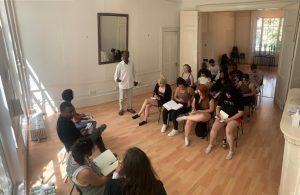
Shakespeare in Performance with Leo Wringer
Girl on an Altar also played with myth – this time imagining the consequences for Clytemnestra if she didn’t exact revenge on Agamemnon when he returned home. Brutal, poetic, compelling and uncomfortable to watch, this was a brilliant production superbly acted. Nina Bowers, who played Cassandra in Girl on an Altar, visited BADA to run a masterclass for the group. The brilliant Evvy Miller also led an active masterclass session which explored yet more approaches to performance. In addition to all this during our two weeks in London we visited the British Museum and were given an electric talk by Claire Catenaccio from Georgetown University on Greek productions in the US today.
The result of all this was a total immersion in Greek theatre which set us up perfectly for our next location: Greece.
The flight from London to Athens takes just under 4 hours, taking us across mainland Europe almost to its most southeastern point. Upon arrival we were met by Kostas Arampapaslis, a philosophy professor and our companion throughout our travels in Greece. Our first location was Delphi, arriving there in the dead of night after passing through the beautiful lit-up village of Arachova on the slopes of Mt Parnassus. We checked into our hotel and grabbed some rest before our first morning in Greece.
Waking up in Delphi is an experience like no other: it’s place that has a magic and rhythm all of its own. After breakfast overlooking the valley with views down to the village of Itea nestled by the waters, we visited the sanctuary – a UNESCO World Heritage Site and a place considered sacred by ancient Greeks who believed that Delphi was the centre of the world, its omphalos or navel. It was in this sanctuary that Apollo’s oracle gave cryptic advice to travellers from across the ancient world. We were guided round its incredible treasuries, theatre and stadium – and we even read the opening of Euripides’ Ion at the Temple Of Apollo – the exact location where the play takes place.
In the afternoon we had the opportunity to rehearse our scenes at a private amphitheatre with views down to the Gulf of Corinth canal. It was a stunning setting, and truly illuminating to play our scenes and speeches outdoors – the way they would have been performed originally.
The following day we traveled to Nafplio where we stayed for three nights. Nafplio was the first capital of Greece when it gained its independence in 1821. This was the first chance for everyone to enjoy some proper time off! Nafplio is situated on the Argolic Gulf, with beaches in walking distance from the town centre. The town itself is truly beautiful, with it’s pastel-coloured buildings linked by vibrant bougainvillea vines.
Harvard’s Center for Hellenic Studies has its Greek base in Nafplio, in a stunningly bright white building with blue shutters overlooking the port. We had access to their teaching rooms during our stay and we used them to good effect: we carried out more scene work, participated in seminars with academics from the University of the Peloponnese, and tried creative writing exercises.
Nafplio is perfectly located for visiting some of the most remarkable sites of the ancient world. Our first day trip was to Mycenae where we saw the so-called Tomb of Agamemnon, and the monumental Lion Gate (dating from approx 1200 BCE). Our chorus work with Joyce focussed on a chorus from Agamemnon, so it was incredible to walk these routes. On the second day in Nafplio we visited the monumental theatre of Epidaurus which dates from the late 4th Century BCE. The theatre’s acoustic is extraordinary – I sat all the way at the top of the auditorium while students took it in turns to recite speeches from tragedy or Shakespeare. Without any amplification I could heart each one of them crystal clearly. We even had the chance to perform as a chorus, acting the first choral ode from Agamemnon – it still gives me goose bumps just thinking about it!
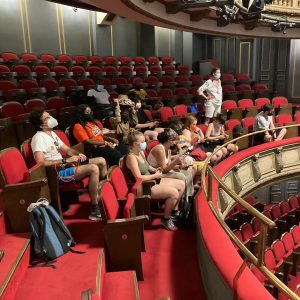
Sitting in on rehearsals of “Ajax” at the National Theatre of Greece
After one last night in Nafplio our coach driver drove us two hours to Athens – what a contrast! Athens is a bustling, beautiful city of 5 million people – it has exceptional theatre facilities and an extraordinary history. We stayed close to the Acropolis, right at the very heart of the ancient and modern Athens. Our fantastic guide Smaro showed us round – not only to the Acropolis (and its brilliant museum), but also along the route of the Panathenaic Procession and around the ancient agora. We had workshops with prominent Greek choreographer and director Sofia Paschou, and also had the chance to work with Agyris Xafis. Argyris is a celebrated actor and director with the National Theatre of Greece who was in the midst of rehearsals for the National’s production of Ajax (which opened in Epidaurus later that summer). Over the course of a 3-hour workshop he let us into his process and provided incredible insights for how to approach tragedy in performance. To cap it all he secured permission for us to sit in on rehearsals of Ajax at the National, so that we were able to watch a sneak preview of the show. This journey from theory to practice is exactly what the course set out to do, and it was a real highlight of our month together.
In each location we stayed we shared dinner on the final evening, and Athens was no exception. Our restaurant of choice was Thespis (appropriately enough) and offered us rooftop dining with delicious traditional Greek cuisine. It was the perfect end to a packed and fulfilling time in Greece.
The final leg of the course took place in Oxford. After spending time in the very places where these plays premiered over 2500 years ago, Oxford was the perfect location for exploring how these works of art were handed down to us – and how people reinterpret them today. Once again we teamed up with Fiona Macintosh from the APGRD who curated an exceptional programme of artists and academics to run sessions for us. If that were not enough, we also performed amongst the statues of the Ashmolean Museum and at a conference on our final evening.
The Greek Theatre Program in 2022 was an unparalleled combination of events, experiences, locations and people – every day brought a fresh challenge, a new perspective and a unique experience. I want to thank the wonderful 17 people who formed such an incredible ensemble during our time together and I look forward to welcoming future students to this exceptional course.
Visit our Greek Theatre page for more information about the course and to submit your application.

